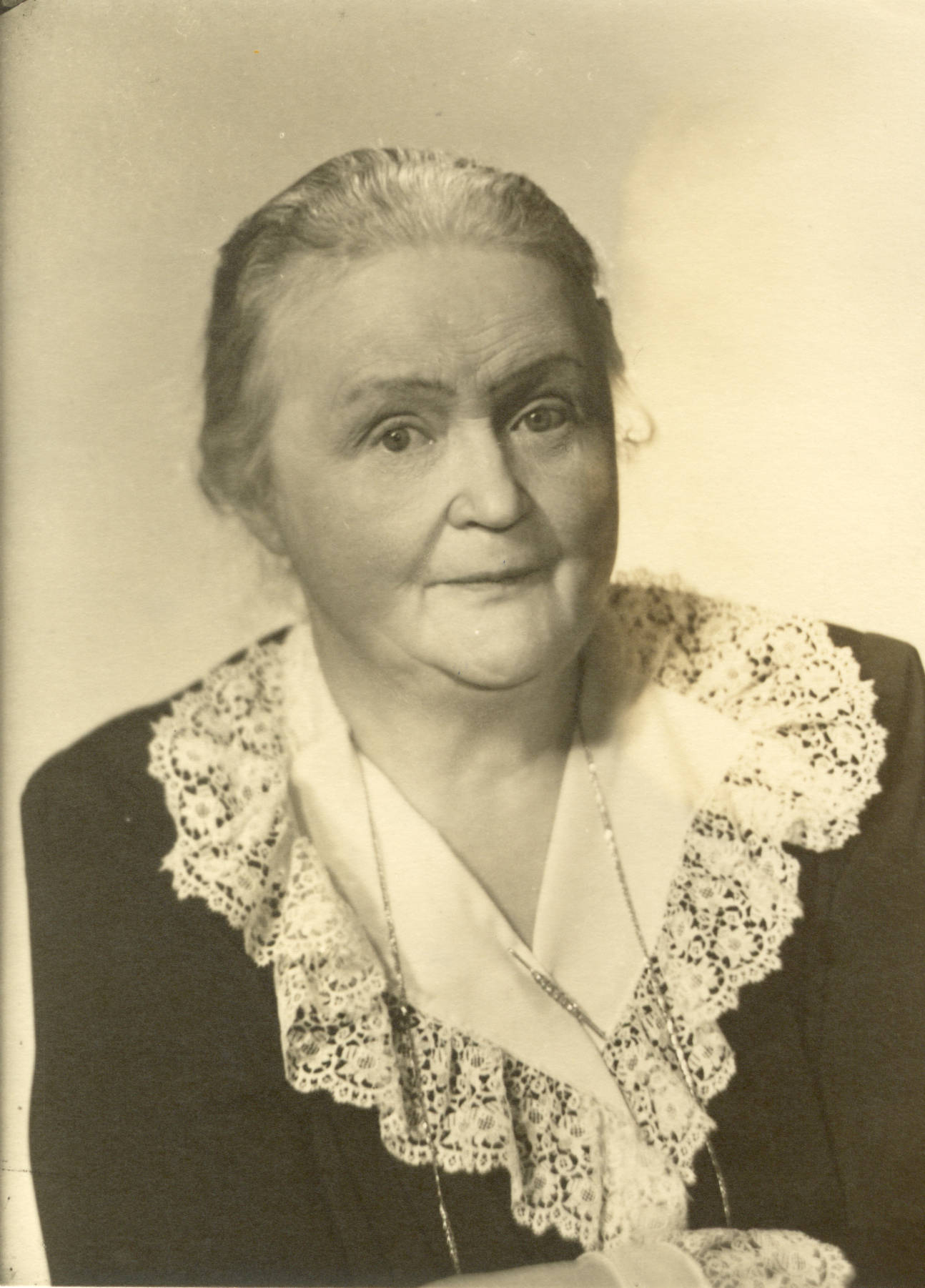
Hella Wuolijoki
Hella Wuolijoki (until 1908 Ella Marie Murrik; pseudonym Juhani Tervapää; 22. VII 1886 – 2. II 1954) was a playwright and prose-writer writing in Finnish, and a public figure in Finland.
She was born on the former premises of the Ala tavern in Helme parish. Her father, Ernst Murrik, was a parish clerk and schoolteacher. Her mother, Katarina Murrik, earned a supplement to her husband’s teaching salary by keeping the Ala tavern. In 1897 the Murrik family moved to Valga, where Ernst Murrik kept a bookshop for a while. The future writer began her studies at Valga girls’ school in 1897. From 1901 to 1904 she attended the Pushkin Girls’ Gymnasium on Riia street in Tartu, where she graduated with a gold medal. With the help of the first Estonian to gain a doctorate in folk poetry at the University of Helsinki, Oskar Kallas, the future writer carried on her studies in Helsinki. In 1904 she entered the faculty of philosophy at the University of Helsinki to study folklore, aesthetics and history. In 1908, on the basis of a cycle of folk poems, she compiled a study, Vaenelaps ema haual (‘The Orphan at Her Mother’s Grave’) and graduated from the University of Helsinki with a master’s degree in philology. In the same year she married Sulo Wuolijoki (1881-1957), who was a close friend of Lenin. They were divorced in 1923.
From 1914 onward, Wuolijoki was also active as a businesswoman, being especially successful in the field of forestry. From 1931 to 1937 she directed the company Suomalainen Nafta Oy. In the twenties and thirties she participated in Finnish politics, supporting left-wing movements. In 1943 Wuolijoki was charged with treason and with long-term espionage for the Soviet Union, and was sentenced to life imprisonment. However, as early as 1944, the political conditions having changed, Wuolijoki was released. From 1945 to 1948 she was a member of the Finnish parliament and from 1945 to 1949 director-general of Yleisradio (Finnish national broadcast). She never became a member of the Communist Party. Her sister Salme Murrik was an influential founding member of the Communist Party of Great Britain, and her grandchild Erkki Tuomioja is an experienced Social Democrat, a long-serving member of parliament, and Foreign Minister from 2000 to 2007 and 2011 to 2015.
Until 1932, that is, her 46th year, Hella Wuolijoki was an Estonian writer, who was known for her novel Udutagused (‘Those Beyond the Fog’, 1914), and for her play Koidula (1932), which caused plenty of controversy. From that year she started to write consistently in Finnish and on Finnish subjects. The transfer from Estonian to the use of Finnish occurred over a fairly long period in which she wrote in both languages. She had made her first attempt at a short story in Finnish in the twenties. That story was ‘The lady and the smith’s wife and Liisu’ which appeared in 1922 in the journal Suomen Kuvalehti.
Wuolijoki’s career culminated in the cycle of “Niskavuori” plays, consisting of the following works: Niskavuoren naiset (‘The Women of Niskavuori’, 1933), Niskavuoren leipä (‘Bread of Niskavuori’, 1938), Niskavuoren nuori emäntä (‘The Young Mistress of Niskavuori’, 1940), Niskavuoren Heta (‘Heta of Niskavuori’, 1950) and Entäs nyt, Niskavuori? (‘What now, Niskavuori’, 1953). It was the first of these, Niskavuoren naiset, that achieved the greatest popularity.
The Niskavuori cycle offers a cross-section of a half-century in one Finnish village, but primarily it is the story of one family. Lively and juicy characters, and universal human problems that remain from one period to another, make this story a people’s theatre in the best sense of the word. That is why the Niskavuori stories have been very popular in Estonia as well as a phenomenal success in Finland over the years.
Wuolijoki wrote one play in collaboration with the German playwright Bertolt Brecht. Wuolijoki’s Finnish-themed comedy Iso-Heikkilän isäntä ja hänen renkinsä Kalle (‘The Master of Iso-Heikkilä and His Servant Kalle’, 1946) bears the title Herr Puntila und sein Knecht Matti (‘Mr Puntila and his Man Matti’) in Brecht’s treatment of it.
There is a characteristic vitality about Hella Wuolijoki’s work. In her plays she created several strong female characters.
L. P. (Translated by C. M.)
Books in Estonian
Plays
Talulapsed. Kolmewaatusline näidend. Tallinn: Maa, 1912, 150 lk.
Koidula. Näidend naisest, kes tahtis olla nagu teisedki naised. Tallinn: Eesti Haridusliit, 1932, 137 lk.
Dr. Lucius ja Luuletaja. Toimetaja Jüri Talvet. Tartu: Tartu Ülikooli Kirjastus, 2013, 92 lk.
Novels
Udutagused. Tallinn: Maa, 1914, 180 lk.
Udutaguste Leeni Tartus. Tallinn: Vaba Maa, 1933, 292 lk.
Poetry
Sõja laul. Kokku seatud Hurti wanawarakogudes leiduwate teisendite järgi. Tallinn: Maa, 1915, 46 lk.
About Hella Wuolijoki
Oskar Kruus, Hella Wuolijoki. Tallinn: Virgela, 1999, 302 lk.
Jüri Talvet, Unustatud algus: Hella Wuolijoe filosoofiline näidend “Dr. Lucius ja Luuletaja”. – Hella Wuolijoki, Dr. Lucius ja Luuletaja. Tartu: TÜ Kirjastus, 2013, lk 73-91.



